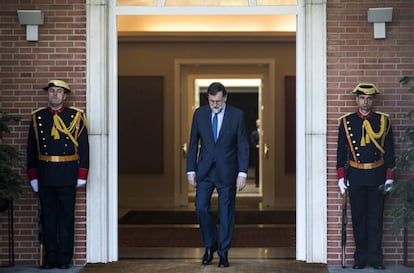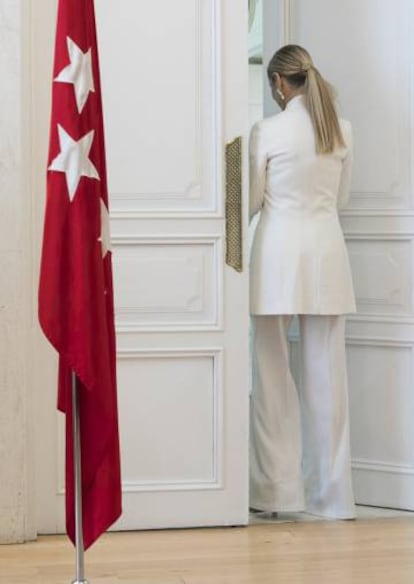Spain’s ruling Popular Party fears fallout after Madrid premier quits
Cristina Cifuentes shoplifting case has put the PP back in crisis mode ahead of elections in 2019 and 2020

A day after Madrid regional premier Cristina Cifuentes resigned over a scandal involving a dubious master’s degree and a shoplifting incident caught on security camera, Spain’s ruling conservatives have been left wondering how this latest crisis will affect the Popular Party (PP) ahead of elections in 2019 and 2020.
Advisors to Prime Minister Mariano Rajoy admitted that finding a replacement for Cifuentes, who had been a leading figure within the party, could unleash an internal war and further favor the rise of Ciudadanos, a protest party that grew out of the economic crisis and is now leading voter opinion polls.
How much are grassroots members going to take?
PP official
“The party has been knocked out,” admitted a high-placed source at PP national party headquarters.
Spaniards will go to the polls next year in local and regional elections, and again in 2020 in national elections. Cifuentes had been the PP’s strongest candidate to retain control of the influential Madrid region, out of the five regional governments still held by the conservative party following its poor showing in 2015.
Even in Madrid, the PP retained power only through a deal with Ciudadanos, but the latter had recently withdrawn its support for Cifuentes over the master’s degree scandal.

Party strategists feel that winning in Madrid next year is absolutely necessary if the PP is to stop Ciudadanos in its tracks and ensure a national victory in 2020. But now that their top candidate has gone, leaving a power vacuum in her place, it is unclear how this goal will be achieved.
“It’s going to be hard to attract new candidates,” admitted a party source. “The most notable individuals within the PP and the government, such as [Deputy PM] Soraya Sáenz de Santamaría, will be less inclined to come down to Madrid, or will directly refuse to run as regional candidates. The PP will be weakened by the time the campaign comes around, because you’re in a boat where everyone is rowing in a different direction. This is happening in a terrible year!”
Some sources within the national leadership seemed rather less concerned.
“The rest of the PP is used to crises and to the Madrid branch’s troubles,” said one source. “We’ve already been through a few of these, and it will pass. As for voters, this only affects the Madrid PP, it will be resolved in a few days, and there is a lot of forgetfulness in politics.”
For now, the party first has to deal with Cifuentes’ immediate replacement at the helm of the regional government. Ángel Garrido has been the acting premier since Wednesday, but national party leaders are not fully behind him, said party sources. And Cifuentes is still formally the leader of the Madrid branch, although this could change as well.

The party’s national coordinator, Fernando Martínez-Maillo, and the deputy communications secretary, Pablo Casado (who also obtained a degree in favorable conditions at the same university as Cifuentes) will be in charge of containing the fallout from the case.
This is the latest in a series of scandals affecting the Madrid PP. In April 2017, veteran party leader Esperanza Aguirre, who had served as regional premier between 2003 and 2012, gave up her municipal seat because of what she described as a sense of responsibility in connection with a corruption scandal involving some of her aides. A year before that she had given up leadership of the Madrid PP for similar reasons connected to the Púnica case. Her successor in the regional government, Ignacio González, has spent time in preventive prison for his alleged role in the Lezo case.
“How much are grassroots members going to take?” wondered a party leader. “And just at a time when we have to get out the vote, prevent voters from switching to Ciudadanos, and find good people to run in the elections... it’s enough to make you worry.”
English version by Susana Urra.
Tu suscripción se está usando en otro dispositivo
¿Quieres añadir otro usuario a tu suscripción?
Si continúas leyendo en este dispositivo, no se podrá leer en el otro.
FlechaTu suscripción se está usando en otro dispositivo y solo puedes acceder a EL PAÍS desde un dispositivo a la vez.
Si quieres compartir tu cuenta, cambia tu suscripción a la modalidad Premium, así podrás añadir otro usuario. Cada uno accederá con su propia cuenta de email, lo que os permitirá personalizar vuestra experiencia en EL PAÍS.
¿Tienes una suscripción de empresa? Accede aquí para contratar más cuentas.
En el caso de no saber quién está usando tu cuenta, te recomendamos cambiar tu contraseña aquí.
Si decides continuar compartiendo tu cuenta, este mensaje se mostrará en tu dispositivo y en el de la otra persona que está usando tu cuenta de forma indefinida, afectando a tu experiencia de lectura. Puedes consultar aquí los términos y condiciones de la suscripción digital.








































